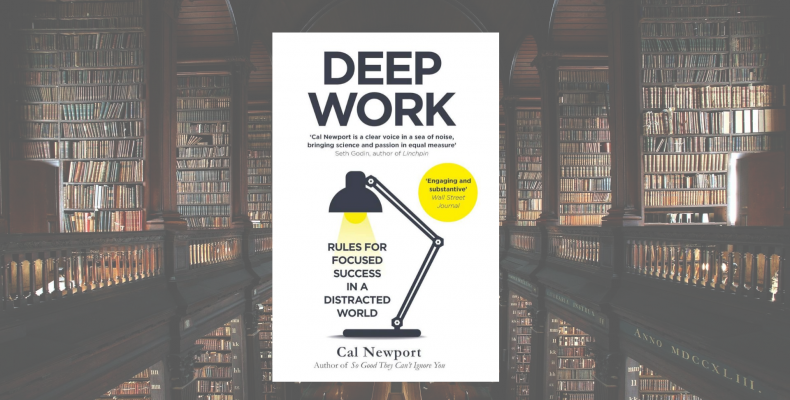Deep Work is a refreshing book about a rare quality only a few people have, according to Cal Newport.
This is the book you, reader, must read if you want to increase your productivity and make the best use of the 24 hours a day that God gaves us all. It’s not just about how to work better, but also about when and where to do the tasks we need or want to do.
This quality turns out to be rare due to the many distractions people face in their daily lifes, including, but not only, the Social Media and other procrastination activities like watching TV for hours long.
So, what’s the solution and the path to achieve this graal of working methods? Newport defends the deep work must be trained by, as an example, taking walks in the forest and contact with the Nature, which many studies proved to be a good starting point to increase the concentration and focus. Then, quit Social Media or, at least, spend less hours a day surfing through Instagram, Facebook, Twitter and so on. The author gives us an example of writters who decided to quit for a few days their social life and see what happened. It turns out that their lifes were better than before. I’ve personally talked with a friend that decided to shut down his Instagram account after reading the book and afirms that was one of his best decisions. Some time ago, I had in my mobile phone an app that allowed me to see how many time I spent using my phone and the distribution of this time across all the applications. I was so surprised with the fact I spent almost 4 hours of my day surfing on Social Media that I made a decision: I wouldn’t spend more that one hour a day using my phone and the remaining 3 hours would be used to read books (I increased a lot the number of books read) and to do other things like talk with friends (which is a good activity to increase productivity, according to the user) and just have fun.
Another advice is to move to a quiet place or division of the house and work from there, since a space free of distractions is the best starting point to a focused hands-on the real work we face. The author gives us the example of Bill Gates (an example I already knew from the Netflix documentary about the founder of Microsoft), who spends some days in a quiet place outside all the busy city traffic so that he can concentrate on performing better the projects and solutions that then proposes to the World.
Deep work itself can produce some benefits, like having more free time to do other things. I was never a person that studied too much time, but when I decide that I’ll study the next hour, that’s a period of time I don’t allow myself to distract with something else and the focus is just on the study. This helps me have more time to do other things and that’s an example of deep work: work less but better and take the extra time for other activities.
And, last but not least, the scheduling of the next days. That’s something I do since I was a little kid: plan the next days or, at least, the next day. This plan includes revisiting all the activities we have to do and then order them by priority. Then, using a paper, a software like Word or just the head (as I do most of times), define periods of the day for each of those activities. These periods should be at least 30-minute long and, if we have smaller tasks to do, like send an email to someone or review something that just takes a few minutes, join them all in a single period called “Smaller Tasks” or some other name you think fits better. I use to do this planning right before I sleep and it turns out to help me manage the multiple tasks I have to do without running out of time for any. As I remmind a Professor I had, she used to say that «the day should be seen as 3×8 hours, 8 for sleeping, 8 for work and 8 to eat and do everything else, including extra activities like sports and hanging out with friends».
The only reason that I rate this book as 4 in 5 is because, from a certain point, the author focus his attention on the email, on the time we spend daily checking the email. As a student, I cannot follow the advice from Newport since I have to check my email more than once a day. And it turns out this constant references make the book boring in some parts. Of course there are some advices given regarding the use of the email I totally agree, like the content of the emails, that should be complete enough and unambiguous in order to not waste time in unnecessary emails.
The first chapter was probably the best of the book and it promissed more than it turned out to be. Still, I strongly recommend anyone interesting in learn more about productivity, time management and deep work itself to learn this guide.
Rating 4/5
Read in 2021
